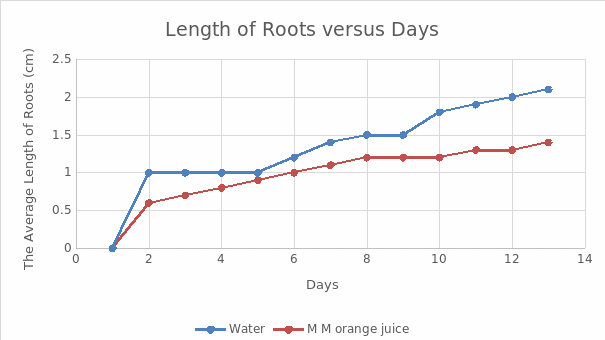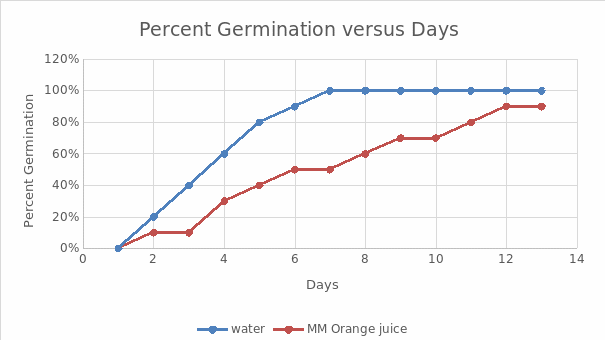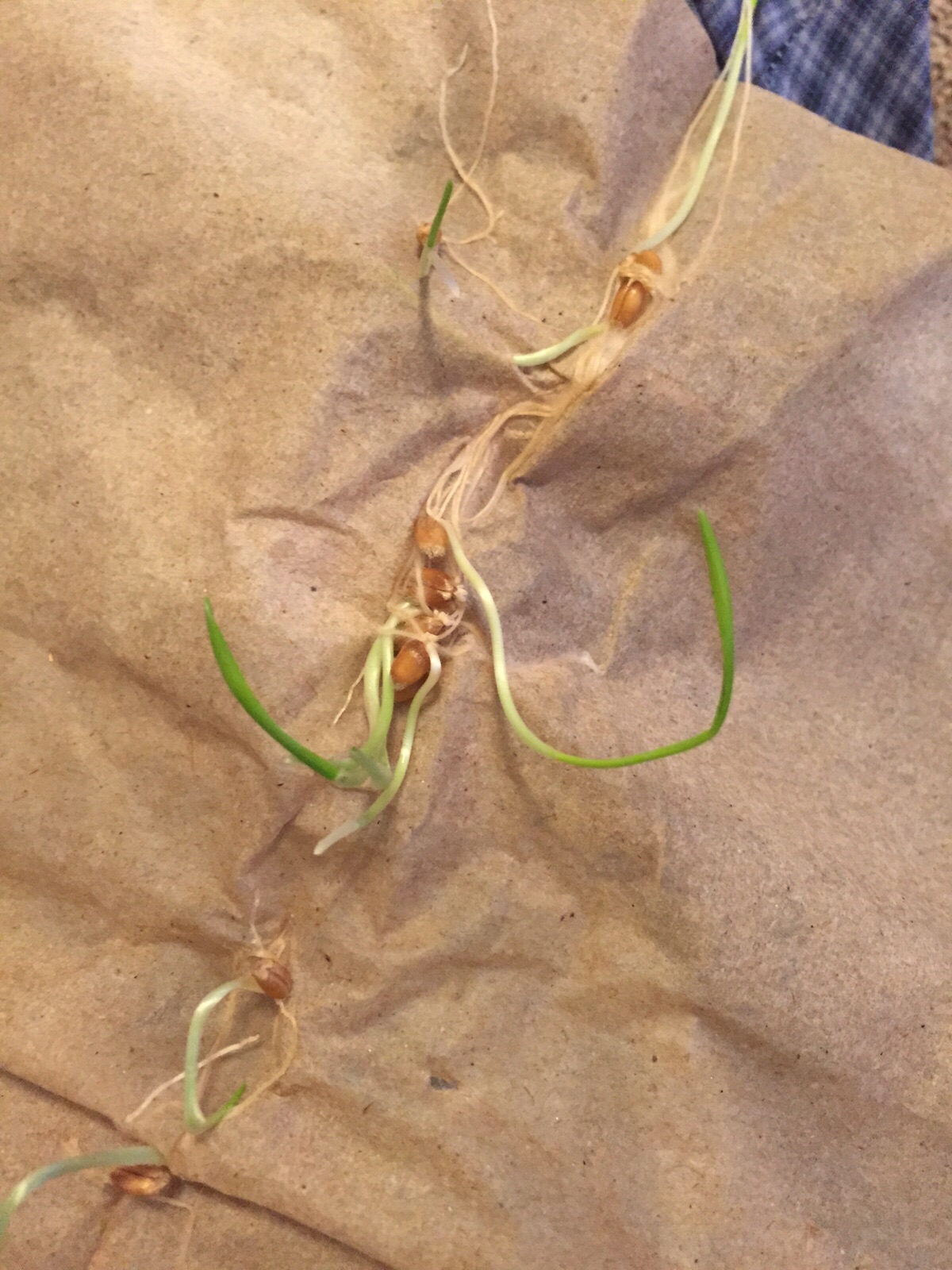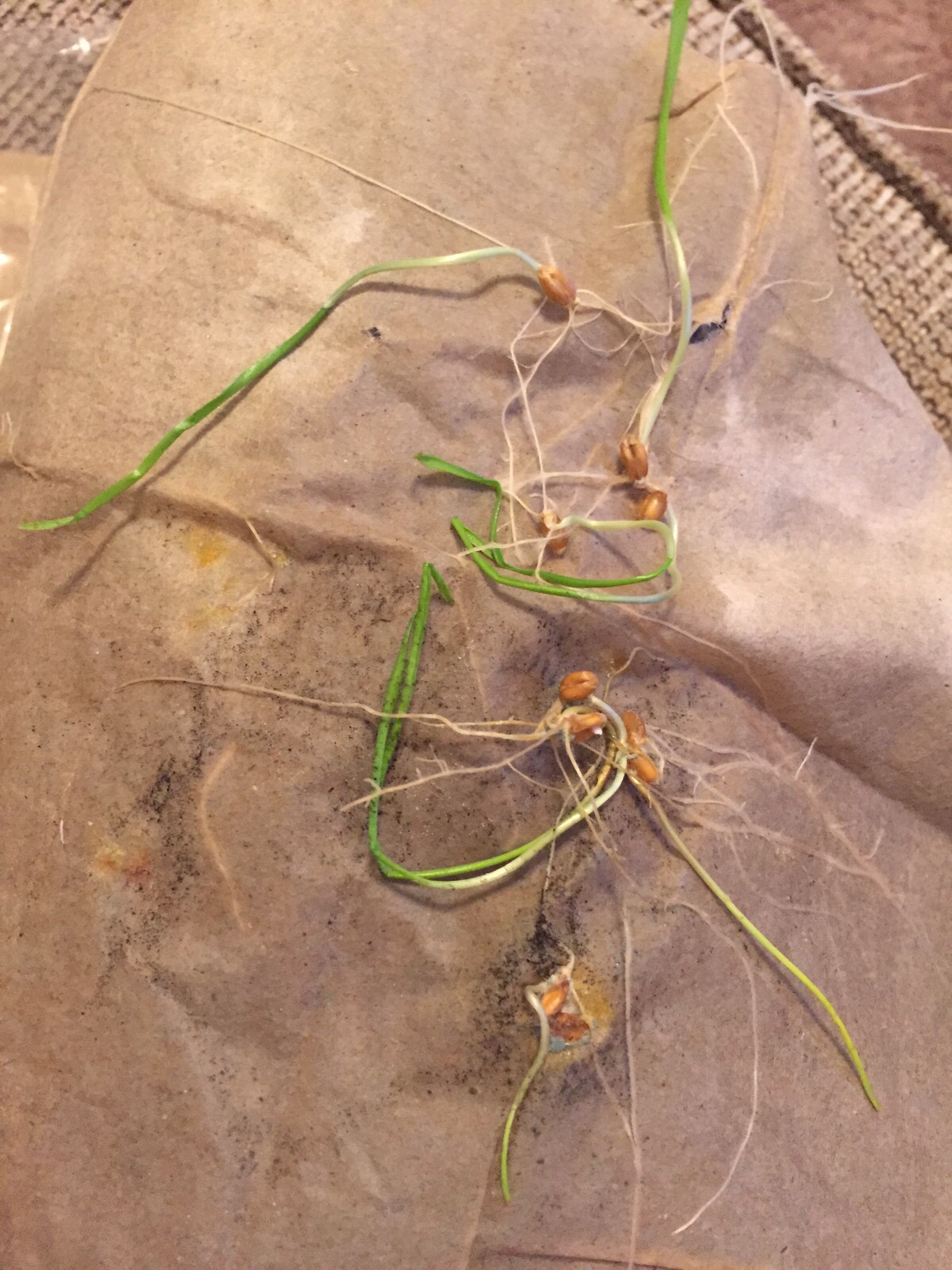Research Objective
The objective of the study is to determine the effect of orange juice on the germination of wheat seeds by examining the germination rate and the growth of roots.
Introduction
Germination is a biological process that entails different biochemical changes, which are subject to diverse environmental conditions. In angiosperms, which are plants that bear seeds, germination is a delicate biological process that determines their ability to reproduce. Germination is a delicate process because seeds and seedlings are sensitive to various conditions in their environment. Environmental conditions such as oxygen concentration, salinity, temperature, moisture, and pH are some of the factors that have a marked influence on the germination of seeds. As this study examines the effect of orange juice on the germination of wheat seeds, it focuses on the effect of pH on germination. Orange juice has an acidic pH of about 2.8, which is means that it has a high concentration of hydrogen ions (H+). Zhang explains that a high concentration of hydrogen ions in water reduces the availability of water for germination and disturbs biochemical processes that are essential in the germination of seeds (1623). Therefore, the acidity in orange juice affects biochemical processes and consequently reduces the germination rate of wheat seeds.
Acidity influences the rate of germination because it affects the integrity of the seed membrane, the functioning of enzymes, and the availability of water. Since seeds contain membranes, which protect them from an injurious environment and play a significant role in the absorption of water, acidic conditions interfere with these membranes. Consequently, seeds are not able to absorb water and become vulnerable to destruction. For the germination process to occur, enzymes must hydrolyze polysaccharides in the seeds and provide energy for germination. As enzymes are sensitive to pH changes, acidic conditions reduce their activity or denature them, hence, preventing effective hydrolysis of polysaccharides (Deska 46). Moreover, pH affects germination for it reduces the availability of water for seeds to absorb via osmosis. According to Behairy, El-Danasoury, and Craker, low pH causes water molecules to ionize, which consequently reduces the osmotic potential of seeds (106). In essence, acidity creates a physiological drought that reduces the germination of seeds. In this view, it is apparent that acidity has a marked influence on the germination of wheat seeds.
Hypothesis
The study hypothesizes that orange juice affects the germination of wheat seeds by reducing the germination rate and inhibiting the growth of roots.
Prediction of Results
In line with the hypothesis, the study predicts that orange juice affects the germination of wheat seeds by reducing the germination rate. Orange juice has a pH of 2.8, which creates an acidic environment and affects biochemical processes involved in the germination of seeds. Fundamentally, the acidic conditions brought about by the orange juice reduce the osmotic potential of seeds and create physiological drought. Consequently, the germination rate reduces since seeds are unable to absorb and utilize water effectively for the germination process.
Furthermore, acidic conditions interfere with the integrity of seed membranes and reduce the absorption of water via osmosis. Since the acidic conditions created by orange juice reduce the activity or denature enzymes, they prevent the occurrence of vital biochemical processes involved in the germination of seeds. According to Deska, acidic conditions deactivate or denature enzymes, and thus, prevent them from hydrolyzing polysaccharides and generating energy for the germination of seeds (46). Hence, germinating seedlings do not get sufficient nutrients to expedite the germination process. In the aspect of the growth of roots, the study predicts that orange juice inhibits the growth of roots by affecting the integrity of cells involved in the absorption of water and creating a physiological drought. Hence, prediction holds that orange juice reduces the germination rate and growth rate of roots.
Materials and Methods
The materials that the experiment used are Ziploc bags, paper towels, water, 20 wheat seeds, and orange juice. The experiment was set up using 10 wheat seeds in the control setup and 10 wheat seeds in the experimental setup. In the control setup, a paper towel was folded, and 10 wheat seeds were placed in it. Subsequently, the folded paper towel containing wheat seeds was wetted with water, inserted in a Ziploc bag, and sealed. In the experimental setup, a paper towel was folded, and 10 wheat seeds were placed in it. Successively, the folded paper towel with wheat seeds in it was wetted with orange juice, put in the Ziploc bag, and sealed. Both Ziploc bags with wetted wheat seeds were placed in a drawer with the same environmental conditions and at room temperature. The observations were made daily for 13 days to examine the germination of seeds and the growth of roots. The number of seeds that germinated was counted and the lengths of roots were measured during each observation. The findings were then tabulated for further analysis.
Results
Table 1 and Table 2 below display the results of the study. Table 1 displays the average length of roots for 13 days while Table 2 displays the cumulative number of wheat seeds that germinated each day for 13 days.
Table 1: The average length of roots.
Table 2: The germinated number of wheat weeds.
Discussion
The findings show that orange juice inhibits the growth of roots of wheat seeds. Figure 1 below displays a trend of growth, which shows that the average lengths of wheat seeds’ roots grown in water are longer than the average lengths of wheat seeds’ roots grown in orange juice. Descriptively, on the first day, the lengths of roots were zero because none of the seeds had germinated. During the second day through to the fifth day, the average length of roots was 1cm while the average lengths of roots in wheat seeds that germinated in orange juice were 0.6 cm, 0.7 cm, 0.8 cm, and 0.9 cm respectively. By the ninth day, wheat seeds in the water had roots with an average length of 1.5 cm while wheat seeds grown in the water had an average length of 1.2 cm. The average length of roots increased exponentially in wheat seeds grown in water, in that, by the twelfth day, it was 2 cm while that of wheat seeds grown in orange juice stagnated at 1.3 cm. By the end of the thirteenth day, the average length of roots of wheat seeds grown in orange juice was two-thirds that of wheat seeds grown in water. Hence, the findings demonstrate that indeed orange juice inhibits the growth of roots of wheat seeds.
Analysis of the results indicates that they conform to findings established in other studies that examine the impact of pH on the germination of seeds. Mandic et al. found out that low pH decreases the growth rate of seedlings because it induces osmotic stress to the roots (7006). Essentially, osmotic stress occurs because acidity causes ionization of water molecules, and thus, prevents their absorption. Consequently, roots of germinating wheat seeds experience physiological drought that inhibits biochemical processes from taking place optimally. Zhang adds that low pH reduces the activity of enzymes that mediate diverse biochemical processes in seeds (1623). Thus, reduced activity of enzymes means that biochemical processes do not occur optimally to hasten the growth of roots. In this view, the findings of the study confirm that even orange juice inhibits the growth of roots in wheat. Therefore, the implication is that wheat seeds do not grow well in acidic conditions because they inhibit the growth of roots.

The findings also show that orange juice reduces the germination rate of wheat seeds. Comparison of the germination rates of wheat seeds grown in water and those grown in orange juice indicate that there is a significant difference. Comparatively, during the first day, none of the seeds had germinated in both the control setup and the experimental setup. However, during the second day through to the seventh day, the germination rate of wheat seeds in water doubled the germination rate of wheat seeds in orange juice. Specifically, the percent germination of wheat seeds in water was 40% and 80% during the third day and the fifth day respectively. In contrast, the percent germination of wheat seeds placed in orange juice was 30% and 40% during the third day and the fifth day respectively. By the seventh day, the percent germination of wheat seeds grown in water reached 100% while that grown in orange juice was 50%. At the thirteenth day, which is six days later when compared to percent germination of wheat seeds grown in water, the percent germination of wheat seeds grown in orange juice reached 90%.

The analysis of the findings confirms that orange juice reduces the germination rate of wheat seeds. Specifically, orange juice reduces germination rate of wheat seeds by 50%. Behairy, El-Danasoury, and Craker note that pH reduces the rate of germination by affecting absorption of water and the activity of enzymes. Orange juice increases concentrations of hydrogen ions and consequently creates physiological drought. Gordana et al. explain that acidity upsets biochemical processes that are integral in the germination of seeds (24). Therefore, the findings of support the hypothesis of the study that orange juice reduces the germination rate of wheat seeds.
Conclusion
Germination is a biochemical process that is sensitive to changes in pH. The findings of the study show that orange juice reduces the germination rate and inhibits the growth of roots of wheat seeds. Quantitatively, orange juice reduces germination rate by 50% and inhibits the growth of seeds by a third. The implication of the study is that wheat seeds do not grow optimally under acidic conditions.
Works Cited
Behairy, Rehab, Mohamed El-Danasoury, and Lyle Craker. “Impact of ascorbic acid on germination, seedling growth, and enzyme activity of salt-stressed Fenugreek.” Journal of Medicinally Active Plants 1.3 (2012): 106-112. Print.
Deska, J., Kazimierz jankowski, Antoni Bombik, and Jolanta Jankowska. “The effect of growing medium pH on germination and initial development of some grassland plants.” Acta Scientiarum Polonorum Agricultura 10.4 (2011): 45-56. Print.
Gordana, Bukvic, Sonja Grljusic, Vlatka Rozman, Dragana Lukic, Rajka Lackovic, and Dario Novoselovic. “Seed Age and pH of Water Solution Effects on Field Pea (Pisum sativum L.) Germination.” Notulae Botanicae Horti Agrobotanici Cluj-Napoca 35.1(2007): 20-26. Print.
Manddic, Violeta, Vesna krnjaja, Zorica Tomic, Zorica Bijelic, Miroslav Zujovic, Aleksandar Simic, and Slaven Prodanovic. “Genotype, seed age and pH impacts on germination of alfalfa.” Romanian Biotechnological Letters 17. 2 (2012). 7005-7021. Print.
Zhang, Hai-yan. “Effects of simulated acid rain on seed germination and seedling growth of different type corn (Zea mays).” Chinese Journal of Applied Ecology 24.6 (2013): 1621-1626. Web.
Appendices
Control

This image shows the seeds that germinated in M M orange juice after 13 days.
Experiment


